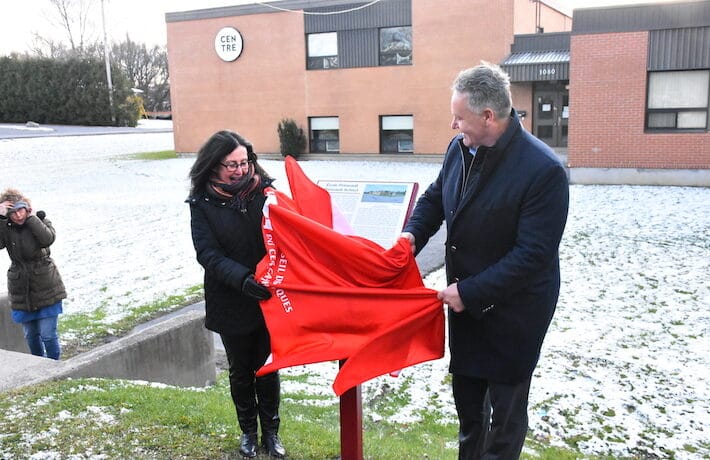
The “Société franco-ontarienne du patrimoine et de l’histoire d’Orléans“ (SFOPHO) continued several of its activities by going digital via Zoom. We had over 40 virtual participants at our last Annual General Meeting and over 77 participants at our virtual book launch, “If our stained-glass windows could talk…”
We continue to reach our members through our historical capsules published almost every Monday on our Facebook page, as well as through our newsletters published on our website a few times a year, which reports on our activities and updates on the progress of our future projects. We also regularly publish a historical chronicle in L’Orléanais, a French-speaking community newspaper. We have participated virtually in the setting up of the “Club international francophone des Orléanais et des Orléanaises.” We have begun the conservation of our archives and we are currently planning virtual activities to celebrate our 10th anniversary. The pandemic will not stop us!
Photo: Unveiling of Préseault School by Nicole Fortier.
Photo: © SFOPHO, 2020.
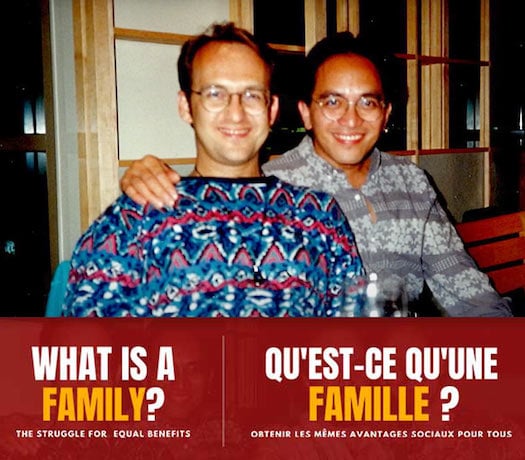
2020 was likely the most difficult year since the Workers’ History Museum founding on January 11, 2011. COVID-19 restrictions hit us hard in early March 2020 as we had to postpone our Annual General Meeting, Public Service Alliance events we had planned on attending were cancelled and all of our regularly planned events, like our Trivia Nights and storytelling evening were cancelled. We did not want to put any of our members or supporters in a potentially risky situation.
Instead, we decided to take the time and work on redesigning our website to make it better and to digitize all of the products and projects that were not on the website. We were able to do further work on our video about Women at the bargaining table. We continued work on the documentary, Never Forgotten, about the On-to-Ottawa Trek of 1935 with subtitles and a resource guide for teachers prepared by a graduate student at Western University in London Ontario.
Over the summer we hired two students, Candide Uyanze and Jenna Emslie through Young Canada Works to work on two new projects. Candide took the raw footage and created the full-length documentary, ‘What is A Family?’ about the struggle for equal benefits. Jenna begin the research for an online exhibit titled Pandemics, People and Public Health: Stories from the Frontline covering pandemics that affected people in the National Capital Region over the last 130 years. This exhibit will go live later in 2021 and the video -that launched virtually in late November 2020 on YouTube has over 1,000 views to date.
We partnered with the North Lanark Regional Museum in Appleton to highlight Working in the Ottawa Valley for our annual calendar.
Work continues on new projects and determining ways to reach out to our members and supporters as the pandemic is still here.
Here is to 2021 being a better year for all of us.
Photo: ‘What Is A Family?’ Documentary created by Candide Uyanze. Photo: © Workers’ History Museum, 2020.
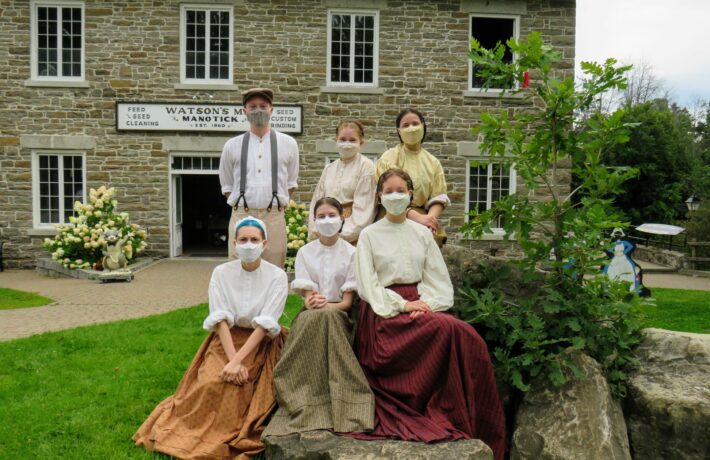
Built in 1860, Watson’s Mill has remained resilient over 161 years as an operational water powered flour mill.
The challenges and opportunities presented by the COVID-19 pandemic were met head on by the staff, volunteers, and visitors of Watson’s Mill. Everyone remained committed to the Mill being accessible. We were able to safely open, providing a much needed escape for the community. We provided alternative ways to enjoy old past times through our 5525 Music Series, our Drive Through Trick or Treat and online Christmas Craft Market.
When our community could not come to the site, we were able to bring the site to them through our 3D virtual tour. We broadened horizons through our #FarmFriday vlogs, provided new go-to bakes on #MakeitMondays, fun and education through our Kid’s Activity Kits and brought holiday cheer through a virtual Advent Calendar. 2020 will certainly be a part of Watson’s Mill continuing story.
Photo: Staff in costume outside the Mill. Photo: © Watson’s Mill Manotick Inc.
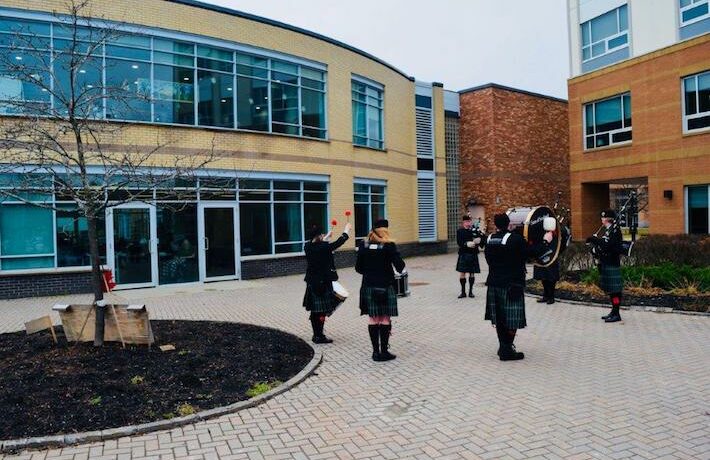
2020 proved to be a year like no other for all of us. Those of us who are lucky enough to play music and share it with others had to look for ways to keep going, to keep connected, and to keep inspired. In our own ways, the band of the Sons of Scotland was able to do just that, just in our own backyard.
Practices went online, emails and calls were sent out, and retirement homes became our stages. We went to so many and played outside for the residents – even if they just looked out their window and waved at the end, it was so meaningful for us and them, and kept our hearts full. The pipe band has always provided music and entertainment to many, and with the year that was, proved that after 125 years, our love for it and commitment to keeping it alive has not changed, and it never will.
I am the proud Pipe Major of the Sons of Scotland, and we are your community pipe band.
– Bethany Bisaillion
Photo: Sons of Scotland Pipe Band who undertook to perform for seniors sequestered in residences on Porter Island on National Tartan Day (April 6). Photo: Bethany Bisaillion © Sons of Scotland, 2020.
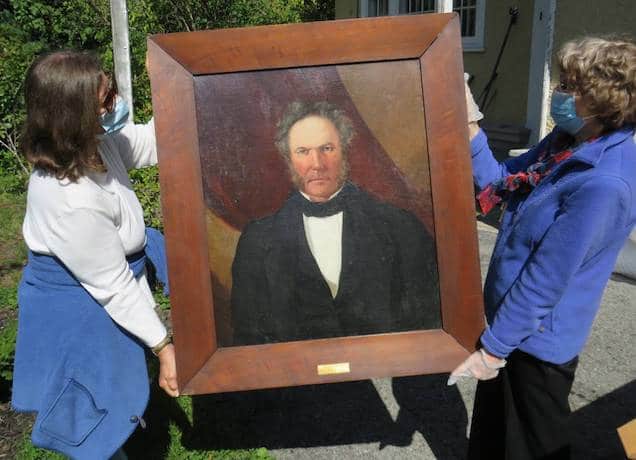
The Pinhey’s Point Foundation began 2020 with great expectations for marking the 200th anniversary of Hamnett Pinhey’s arrival in Canada and the 40th anniversary of the Foundation. We were helping Pinhey descendants organize a family reunion and were hard at work on special bicentenary exhibits.
While the reunion was postponed, we continued to work on the exhibits. One is a joint project with our friends at City of Ottawa Archives highlighting the earliest books in our respective collections, both with a Pinhey provenance, and the lives of the ancestors who signed the flyleaves and through whose hands they passed.
Lockdown time encouraged people to embark on housecleaning and sorting, resulting in an increased number of inquiries and artifact donations. Some very special heirlooms were donated by a descendant to mark the 200th, and we look forward to sharing them.
Our City partners opened the house in August/September under strict protocols. Our hats off to the staff who assisted visitors. We installed small additional exhibits prior to opening. In late September the site closed for necessary repairs, and we worked with our friends at the City to facilitate that. We have also been working with a designer to move the Foundation website to a WordPress platform, and are looking for someone willing to help us post updates periodically once it is up and running.
We look forward to welcoming visitors back to the site when conditions permit!
Photo: Welcoming a new addition to the Pinhey’s Point Foundation Family. Photo: © Pinhey’s Point Foundation, 2020.
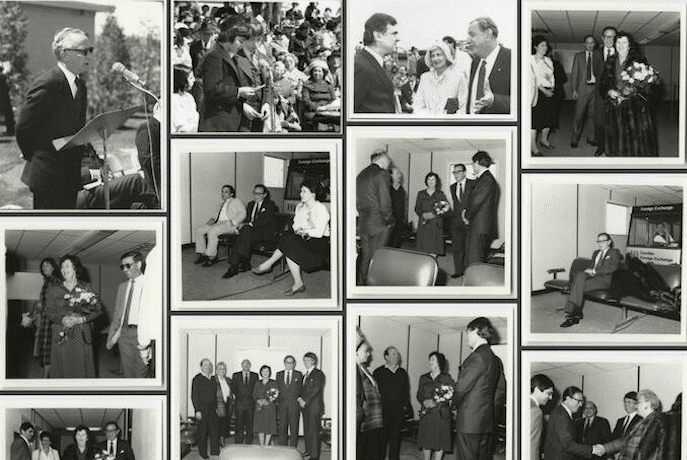
This past year, the Ottawa Jewish Archives has made it a priority to focus on our presences online. With the pandemic pushing everything online it was important that we adapted and found ways to still connect with our community regardless of location.
The easiest way to achieve this goal was to increase our social media engagement. In March, the archives began posting daily stories and photos of events, places and people that the community would remember and have the ability to interact with. It wasn’t just the archives contributing, though. The archives encouraged people to submit their own photos and stories, some of which the archives did not have, to share with the public. We also regularly posted photos that were lacking identification in our database for people to help fill in the blanks. Both were really engaging ways for the public to connect with the archives while directly contributing to our collection and its history.
Photo: “Do you know who I am?” social media campaign from the Ottawa Jewish Archives. Photo: Teigan Goldsmith © Ottawa Jewish Archives, 2020.
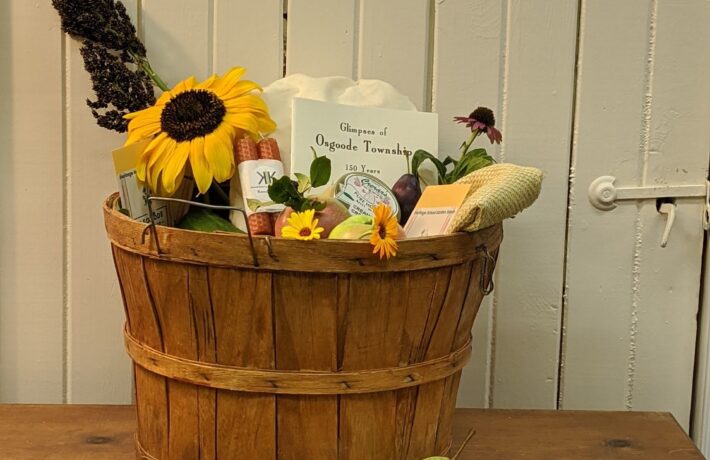
The Osgoode Township Museum is located off Bank St. in rural Ottawa south. The site is home to a 10,000 square ft. heritage garden, an Orchard, an Agriculture Barn with an impressive exhibition of early farming equipment and a mid-century school house which houses the collection and permanent exhibits. We are a small but mighty and light-hearted staff of 4.
Like many other heritage institutions, our museum underwent unprecedented changes in 2020. We adapted early on to a new reality and thrived, creating new ways to engage with our community through social media, virtual programs, virtual content for classrooms/homeschoolers and virtual events. We even rebranded! Take-home kits have been huge in helping us still meet our fundraising goals, while bringing experiences to our community safely at home. We also somehow managed to build a new permanent exhibit in 2020 that we can’t wait to share with our community!
Photo: Harvest bushel baskets featuring local produce and compiled by the Osgoode Township Museum.
Photo: © Osgoode Township Museum, 2020.
The Ottawa Museum Network provides a strong voice for Ottawa’s community museums and a collaborative framework within which they can enhance their impact. Resiliency is at the heart of our organization.
During the beginning stages of the pandemic, our organization put into place tools and procedures that took care of the mental and physical well-being of our staff and members.
We hired three remote interns through Young Canada Works to advance program innovation support, collection digitization and digital strategy at member museums. Social media was utilized as a resource to lend even greater support to our members. In particular, we used our annual advertising campaign and social media platforms to support Vanier Museopark after the loss of their sugar shack in August 2020.
Looking ahead to 2021, we will continue to lead efforts to support the sustainability of our community museums!

The Mississippi Valley Textile Museum (MVTM) is a leader in the collection, conservation, study and dissemination of artifacts and documentation related to the Mississippi Valley and Canada’s industrial textile heritage for over 35 years.
This past year, the Museum was awarded the 2020 Ecclesiastical Insurance Cornerstone Award (Resilient Historic Places) from the National Trust for its benefit to a community over a sustained period of time, with a successful track record of 10 years or more.
Despite ongoing pandemic challenges, The Mississippi Valley Textile Museum displayed continued strength and innovation in continuing to deliver high calibre exhibitions and programming online.
Fibrefest 2020 continued with success online, recruiting artists from across the province.
And as the community grappled with COVID-19, The MVTM collaborated with Ryan Gordon Photography to capture the historic shift through the eyes of everyday people in Mississippi Mills in the exhibition, ’Faces & Fabric of a Small Town During Pandemic’. In a historic win for the community, the inaugural Pride Mississippi Mills Committee and the Mississippi Valley Textile Museum championed and fought for the inclusivity of 2SLGBTQIA+ people and June was declared Pride Month by the Municipality of Mississippi Mills Council.
We cannot wait for what is to come for our extraordinary organization.
Photo: Mayor Christa Lowry standing in solidarity with the Pride in Mississippi Mills Team, spearheaded by Michael Rikley-Lancaster, MVTM Curator. Photo: © Mississippi Valley Textile Museum, 2020.
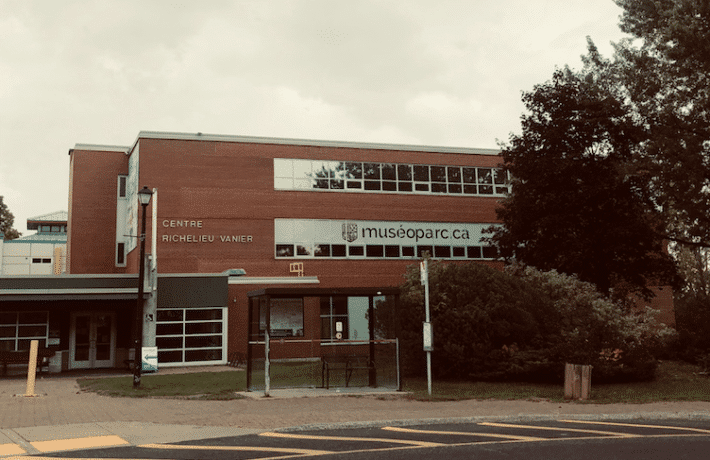
Bonjour, Kwey, Hi,
Like all of us in 2020, the Vanier Museopark has faced and overcome many challenges: COVID-19, a fire which devastated our sugar shack, as well as the sudden passing of our general director. 2021 may be equally unpredictable, but the Vanier Museopark has proven that it can reinvent itself by offering digital alternatives to existing activities and by designing new programs while respecting social distancing regulations.
It is through the support of our community and partners that we’re able to look forward to the reconstruction of our beloved sugar shack and the completion of the museum’s renovations. All this without forgetting to celebrate the Museopark’s 15th anniversary, with many surprise activities still to come.
Stay connected!
Photo: Exterior of Vanier Museopark. Photo: © Vanier Museopark, 2020.
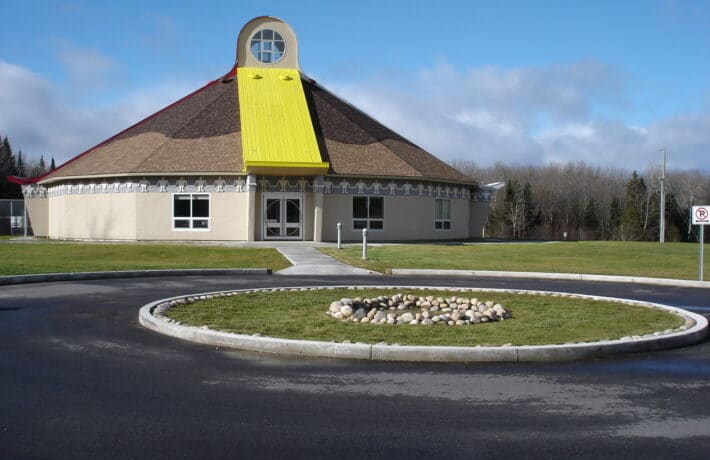
The Kitigan Zibi Anishinabeg Pimadjiwowinogamig is a cultural hub that hosts a small museum. The aim is to educate and share the Anishinabe culture, history and language through its exhibitions; kiosks; tours; workshops (cultural revitalization, awareness and language); language and curriculum development; and work with organizations to incorporate the use of Anishinabemowin and indigenous themes into their exhibits.
The Cultural Centre began around 1977, and by 1979, it relocated next to the community radio station (CKWE103.9FM). In 2003, construction began at a new site and had its official grand opening on December 9, 2005.
With the ongoing pandemic, the Cultural Centre closed, and staff worked from home until mid-August. Despite these challenges, staff managed to enter collections into the database, photograph archaeological artifacts, catch up on administrative work and keep the gift shop going through email, e-transfer and curbside pickup. Despite not having access to internet at home, one of our employees still managed to attend Zoom meetings. If the meeting was lengthy, they would sit in their vehicle, outside the Centre using its Wifi. Our dedicated staff continued to persevere despite new challenges posed by not being able to gather in-person.
The Language Department entered Anishinabemowin into CAN8, an online language learning website specializing in oral production. Photographs and sounds of nature were recorded to create our own royalty free material. They also maintained translation services and created language clips posted to Facebook and Instagram.
From mid-August to January 2021, work resumed at the Centre but remained closed to the public. We are looking into more online activities, classes and tours. Our first virtual cooking session was a success and we are looking forward to our online Algonquin classes.
Photo: Exterior of Kitigan Zibi Anishinabeg Pimadjiwowinogamig. Photo: © Kitigan Zibi Anishinabeg Pimadjiwowinogamig, 2020.